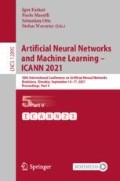Abstract
Neural abstractive summarization models, based on attentional encoder-decoder architecture, can generate a summary closer to human style. However, the generated summaries often suffer from inaccuracy and irrelevance. To tackle these problems, we propose a novel unified summarization model with integrated semantic guide and keyword coverage mechanism. First, we add the integrated semantic guide in the encoder, which helps the encoder-decoder structure grasp the central idea of the full text. Second, in the decoding process, we use the keyword coverage mechanism to reward the attention distribution of keywords, which promotes the generation of more logically related expressions to the central idea. Evaluations on the CNN/Daily Mail dataset demonstrate that our model outperforms the baseline models, and the analysis shows that our model is capable of generating a more relevant and fluent summary.
This work was supported by National Key Research and Development Project (No. 2018YFB1004502) and National Natural Science Foundation of China (No. 61532001) and (U19A2060).
Access this chapter
Tax calculation will be finalised at checkout
Purchases are for personal use only
Notes
- 1.
pypi.python.org/pypi/pyrouge/0.1.3.
- 2.
References
Sharma, E., Huang, L., Hu, Z., Wang, L.: An entity-driven framework for abstractive summarization. In: Proceedings of the 2019 Conference on Empirical Methods in Natural Language Processing and the 9th International Joint Conference on Natural Language Processing (EMNLP-IJCNLP), pp. 3278–3289 (2019)
Scialom, T., Lamprier, S., Piwowarski, B., Staiano, J.: Answers unite! unsupervised metrics for reinforced summarization models. In: Proceedings of the 2019 Conference on Empirical Methods in Natural Language Processing and the 9th International Joint Conference on Natural Language Processing (EMNLP-IJCNLP), pp. 3237–3247 (2019)
Huang, L., Wu, L., Wang, L.: Knowledge graph-augmented abstractive summarization with semantic-driven cloze reward. In: Proceedings of the 58th Annual Meeting of the Association for Computational Linguistics, pp. 5094–5107 (2020)
Durmus, E., He, H., Diab, M.: Feqa: a question answering evaluation framework for faithfulness assessment in abstractive summarization. In: Proceedings of the 58th Annual Meeting of the Association for Computational Linguistics, pp. 5055–5070 (2020)
See, A., Liu, P.J., Christopher, D.: Manning. Get to the point: summarization with pointer-generator networks. In: Proceedings of the 55th Annual Meeting of the Association for Computational Linguistics (Volume 1: Long Papers), vol. 1, pp. 1073–1083 (2017)
Hermann, K.M., et al.: Teaching machines to read and comprehend. In: NIPS’15 Proceedings of the 28th International Conference on Neural Information Processing Systems - Volume 1, vol. 28, pp. 1693–1701 (2015)
Nallapati, R., Zhou, W., dos Santos, C.N., Gülçehre, Ç., Xiang, B.: Abstractive text summarization using sequence-to-sequence rnns and beyond. In: Proceedings of The 20th SIGNLL Conference on Computational Natural Language Learning, pp. 280–290 (2016)
Chen, Y.-C., Bansal, M.: Fast abstractive summarization with reinforce-selected sentence rewriting. In: ACL 2018: 56th Annual Meeting of the Association for Computational Linguistics, vol. 1, pp. 675–686 (2018)
Hsu, W.-T., Lin, C.-K., Lee, M.-Y., Min, K., Tang, J., Sun, M.: A unified model for extractive and abstractive summarization using inconsistency loss. In: ACL 2018: 56th Annual Meeting of the Association for Computational Linguistics, vol. 1, pp. 132–141 (2018)
Fu, X., Wang, J., Zhang, J., Wei, J., Yang, Z.: Document summarization with vhtm:variational hierarchical topic-aware mechanism. In: AAAI 2020 : The Thirty-Fourth AAAI Conference on Artificial Intelligence, vol. 34, no. 5, pp. 7740–7747 (2020)
Li, C., Xu, W., Li, S., Gao, S.: Guiding generation for abstractive text summarization based on key information guide network. In: Proceedings of the 2018 Conference of the North American Chapter of the Association for Computational Linguistics: Human Language Technologies, vol. 2 (Short Papers), pp. 55–60 (2018)
Erkan, G., Radev, D.R.: Lexrank: graph-based lexical centrality as salience in text summarization. J. Artif. Intell. Res. 22(1), 457–479 (2004)
Nallapati, R., Zhai, F., Zhou, B.: Summarunner: a recurrent neural network based sequence model for extractive summarization of documents. In: AAAI, pp. 3075–3081 (2016)
Durrett, G., Berg-Kirkpatrick, T., Klein, D.: Learning-based single-document summarization with compression and anaphoricity constraints. In: Proceedings of the 54th Annual Meeting of the Association for Computational Linguistics (Volume 1: Long Papers), vol. 1, pp. 1998–2008 (2016)
Duchi, J., Hazan, E., Singer, Y.: Adaptive subgradient methods for online learning and stochastic optimization. J. Mach. Learn. Res. 12(61), 2121–2159 (2011)
Boudin, F., Mougard, H., Favre, B.: Concept-based summarization using integer linear programming: from concept pruning to multiple optimal solutions. In: Proceedings of the 2015 Conference on Empirical Methods in Natural Language Processing, pp. 1914–1918 (2015)
Liu, L., Lu, Y., Yang, M., Qu, Q., Zhu, J., Li, H.: Generative adversarial network for abstractive text summarization. In: AAAI, pp. 8109–8110 (2017)
Paulus, R., Xiong, C., Socher, R.: A deep reinforced model for abstractive summarization (2018)
Author information
Authors and Affiliations
Corresponding authors
Editor information
Editors and Affiliations
Rights and permissions
Copyright information
© 2021 Springer Nature Switzerland AG
About this paper
Cite this paper
Lin, W. et al. (2021). A Unified Summarization Model with Semantic Guide and Keyword Coverage Mechanism. In: Farkaš, I., Masulli, P., Otte, S., Wermter, S. (eds) Artificial Neural Networks and Machine Learning – ICANN 2021. ICANN 2021. Lecture Notes in Computer Science(), vol 12895. Springer, Cham. https://doi.org/10.1007/978-3-030-86383-8_27
Download citation
DOI: https://doi.org/10.1007/978-3-030-86383-8_27
Published:
Publisher Name: Springer, Cham
Print ISBN: 978-3-030-86382-1
Online ISBN: 978-3-030-86383-8
eBook Packages: Computer ScienceComputer Science (R0)

